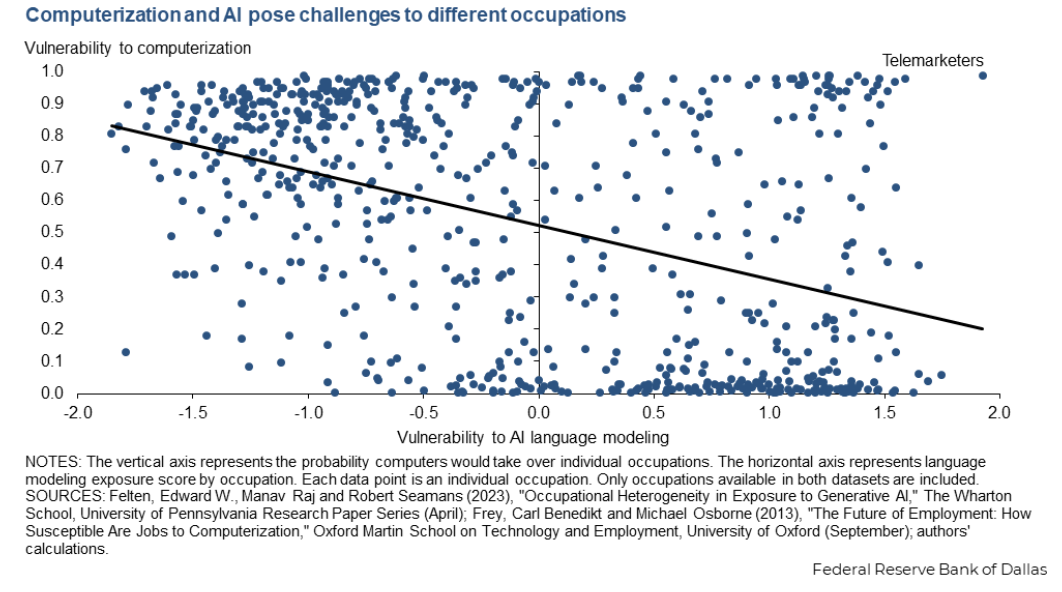Anthropic boss Dario Amodei’s buzzy warning that artificial intelligence could vaporize half of entry-level white-collar jobs within five years makes for gripping headlines. But his forecast of 10–20 percent unemployment deserves scrutiny, not panic. Worries of a robopocalypse for the labor market should take comfort from a new Dallas Federal Reserve study. Researchers there offer evidence that Silicon Valley’s latest doomsday prediction is more likely hysteria than economic history in the making.
In the recent analysis “Will AI replace your job? Perhaps not in the next decade,” economists Mark A. Wynne and Lillian Derr examine what happened to jobs that experts deemed “computerizable” a decade ago. Their findings should humble today’s gloomy AI prophets.
Nearly half of American jobs faced obsolescence by machines, according to a widely referenced 2013 Oxford University study in which economists meticulously assessed the computerization risk of 700 occupations. They famously concluded that 47 percent of America’s workforce was vulnerable to its silicon competitors. Tax preparers, insurance underwriters, and data entry clerks were supposedly on the chopping block.
Yet a decade later, the correlation between computerization risk and actual job losses? From the paper:
… we looked at whether changes in the growth rate of occupations from 2003–13 to 2013–23 were correlated with Frey and Osborne’s measures of computerizability. … Again, there is no correlation between an occupation’s change in growth rate and its susceptibility to computerization … [pointing] to the idea that Frey and Osborne’s computerizability concerns did not have as significant an effect on the workforce as perhaps anticipated.
Fast forward to 2025: AI anxiety has shifted to teachers, architects, and political scientists, according to a new study that attempts to identify occupations most vulnerable to automation from generative AI. Only telemarketers appear on both death lists.

Yet the Bureau of Labor Statistics—whose employment projections “have historically been fairly accurate, according to the Dallas Fed researchers—sees no AI-driven employment collapse ahead. Their latest 10-year forecast shows many AI-exposed occupations actually growing. Statisticians, despite being prime AI targets, are projected to thrive.
True, the BLS assumes “technological progress will be in line with historical experience.” They’re not modeling a scenario where AI achieves superintelligence capable of replacing all remote work, much less super-capable robots handling physical tasks. If AI truly breaks out and moves to full human capabilities or beyond, all bets are off (although I still think there will be lots for human workers to do). But that’s precisely why the Fed study matters. It shows how consistently we’ve overestimated technology’s disruptive power.
From the report’s conclusion:
There is very little evidence of artificial intelligence taking away jobs on a large scale to date. Correlation between AI exposure and the projections of job growth or decline over the next decade remains low. Furthermore, just 10 years ago, our concerns about which jobs were at risk were quite different from the ones we are concerned about today, demonstrating that such considerations evolve. Many jobs once feared to be at risk did not end up showing major decline in employment data.
AI is such a rapidly changing field, we do not know much about its ability to one day have a large overall workforce impact, especially as current studies are mainly speculative. However, like the many technological changes that came before it, AI is a tool. Though rapid improvements in AI capabilities could lead to large workforce effects, over the next decade that worry can be tempered by the current data and the fact that concerns about technological unemployment are not new and rarely come to pass as first anticipated.
So for now, best to stick with the lessons of history, which are clear. Steam engines didn’t create permanent mass unemployment. Computers didn’t eliminate half of jobs. ATMs didn’t end bank tellers. Each technology transformed work rather than destroying it. AI will likely follow suit, augmenting human capabilities rather than replacing humans wholesale. The Dallas Fed’s analysis offers a sobering reminder: When Silicon Valley predicts a job market disruption, bet on evolution, not extinction.
The post Maybe AI Will Replace Your Job, but Such Predictions Are Hard to Make appeared first on American Enterprise Institute – AEI.















